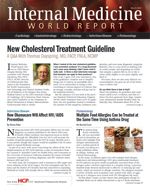Welcome Back to Internal Medicine World Report
If there is one absolute truth in medicine, it is that the truth will change over time.

Simon Douglas Murray, MD
Editor-in-Chief
One of the things I enjoy most about being a practicing internist is having the ability to participate in the lives of patients by helping them make important decisions about their health, which has the potential to influence the course of their lives. This privilege grants me abundant personal satisfaction, but it also carries great responsibility.
For the return of Internal Medicine World Report, renowned lipidologist Thomas Dayspring, MD, FACP, FNLA, NCMP, candidly discussed the new cholesterol treatment guidelines published by the American Heart Association and the American College of Cardiology last November. Though he has definite opinions on the guidelines, he has earned the right to render them, given his extraordinary fund of knowledge about lipid disorders acquired throughout his long and distinguished medical career.
Treatment guidelines have been issued for a wide variety of medical topics and can be a doubleâ€edged sword for practicing physicians. If they are too rigid, then they carry the risk of holding physicians to a standard of care with the potential for legal consequences when they are not followed. On the other hand, guidelines written only from an academic perspective may be confusing to the average physician or may even be considered irrelevant to those of us in the trenches.
In addition, guidelines with too many statistical references can be overwhelming, and we all know statistically significant findings are not always clinically relevant. Lastly, guidelines written by experts are often based upon the results of clinical trials funded by pharmaceutical companies. Extreme caution must be exercised when interpreting those recommendations, as it is naïve to believe experts can always overcome their own intentional or unintentional bias.
Even the method in which studies are presented must be interpreted with caution. For example, when Pravachol (pravastatin sodium) was introduced to the market, we were told it could reduce the risk of coronary events by 30%, which was supposedly proven in the West of Scotland Coronary Prevention Study. When I first heard that statement, I thought it meant for every 3 people given Pravachol, 1 would be spared a heart attack. But what the trial data actually showed was if you gave Pravachol to 10,000 people for 5 years, it would not benefit 9,755 of them. In fact, pravastatin could only be expected to benefit about 245 patients out of the 10,000, because in the study population, there were only 300 expected to have a heart attack if left untreated. While that is a 30% reduction in relative risk, it is only about a 1% absolute risk reduction, which is an important detail I had not heard or thought about.
Nevertheless, there was nothing dishonest in the manufacturer’s claims that Pravachol prevented heart attacks. I also do not think it was their job to educate me about the statistics, because that was my responsibility, and I didn't uphold it. It was only some years later when I actually read the trial results that I realized I had overestimated pravastatin’s benefits.
Because I did not know the facts, I was hardly in a position to recommend treating or not treating patients with Pravachol, which brings me back to therapeutic guidelines. As physicians, we are expected to make important and sometimes life-changing decisions for patients who assume we are making choices based on knowledge and empiric observations. In contrast, decisions based on intuition without at least a rudimentary knowledge of the medical literature are disingenuous and dangerous, though knowledge of the literature without regular interaction with patients is also of little use to clinicians.
I occasionally hear physicians say they are too busy to read. To that, I answer: become less busy. By reading IMWR, attending conferences, speaking with colleagues, and sampling from the multiple flavors of widely available medical information, we earn the right to make important decisions about our patients’ lives, and we can reasonably challenge treatment guidelines when they appear to be inappropriate, biased, or not relevant. It is only by staying current that we differentiate ourselves from the clerks who work in health food stores and freely hand out health advice to their customers.
In IMWR, we will provide topics relevant to the practicing internist on a monthly basis as a complement to other sources of medical information. The topics will be interesting and occasionally controversial, but always based on current medical knowledge. Besides, if there is one absolute truth in medicine, it is that the truth will change over time.
Simon Douglas Murray, MD
Editor-in-Chief
Simon Douglas Murray, MD, is Clinical Assistant Professor of Medicine at Robert Wood Johnson Medical School in New Brunswick, NJ, and Senior Attending in the Department of Medicine at the University Medical Center at Princeton. He has been affiliated with the MDVIP physicians network since 2006 and currently practices internal medicine in Princeton, NJ.
